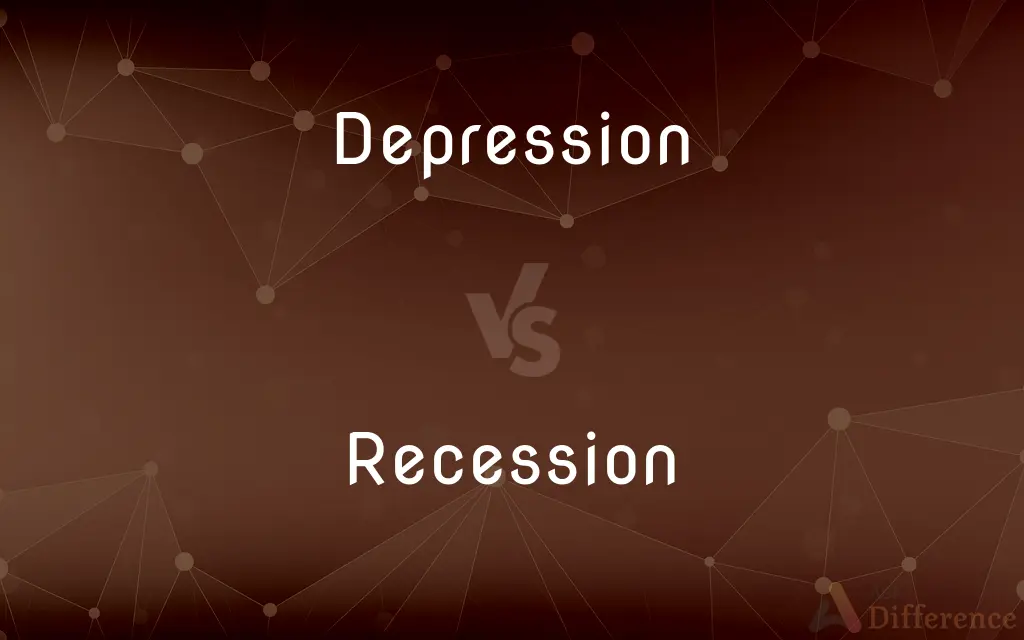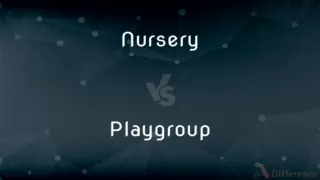Depression vs. Recession — What's the Difference?
By Tayyaba Rehman — Updated on September 15, 2023
A depression is a prolonged, severe economic downturn, while a recession is a shorter-term economic decline marked by decreased GDP for two consecutive quarters.

Difference Between Depression and Recession
Table of Contents
ADVERTISEMENT
Key Differences
A depression stands as one of the most severe and prolonged forms of economic downturns. It stretches longer than a recession and typically witnesses a significant drop in GDP, high unemployment rates, and other grim economic indicators. Conversely, a recession is a period of temporary economic decline, recognized by two successive quarters of a fall in a country's GDP. It's not as prolonged or severe as a depression, but it still impacts businesses and consumers alike.
Throughout history, depressions have been relatively rare but memorable. The Great Depression of the 1930s is often cited as a paramount example, having a monumental impact on global economies for years. Recessions, meanwhile, are more common, occurring as natural parts of economic cycles. While they often cause job losses and financial hardships, they typically don't linger as depressions do.
The terms depression and recession can sometimes be used interchangeably by the general public, but they have distinct differences. While both represent economic downturns, a depression signifies a more profound and long-lasting decline. In contrast, a recession indicates a milder, shorter-lived drop in economic activity.
When considering their impact on everyday lives, depressions lead to extended periods of high unemployment, increased poverty rates, and widespread economic hardship. On the other hand, recessions, though still painful, might be followed by relatively swift periods of economic recovery and growth.
Comparison Chart
Definition
Prolonged, severe economic downturn
Shorter-term economic decline
ADVERTISEMENT
Duration
Years
Typically months
Frequency
Rare
More common, part of economic cycles
Severity
More severe
Less severe than depression
Key Historical Example
The Great Depression
The Great Recession (2007-2009)
Compare with Definitions
Depression
A long and severe recession in an economy.
The Great Depression in the 1930s affected countries globally.
Recession
A decline in a particular set of economic factors.
The housing market faced a major recession.
Depression
A sunken place or hollow on a surface.
Rainwater collected in the depressions on the road.
Recession
A period of temporary economic decline.
The country's economy went into a recession last year.
Depression
A lowering in rank or status.
The depression of the city's reputation followed the scandal.
Recession
In economics, a recession is a business cycle contraction when there is a general decline in economic activity. Recessions generally occur when there is a widespread drop in spending (an adverse demand shock).
Depression
The act of depressing.
Recession
A period of temporary economic decline during which trade and industrial activity are reduced, generally identified by a fall in GDP in two successive quarters
The country is in the depths of a recession
Measures to pull the economy out of recession
Depression
The condition of being depressed.
Recession
The action of receding; motion away from an observer.
Depression
An area that is sunk below its surroundings; a hollow.
Recession
The erosion of a cliff or headland from a given point, as from the action of a waterfall.
Depression
The condition of feeling sad or despondent.
Recession
The reduction of a glacier from a point of advancement.
Depression
A mood disorder characterized by persistent sadness or inability to experience pleasure combined with other symptoms including poor concentration, indecisiveness, sleep problems, changes in appetite, and feelings of guilt, helplessness, and hopelessness. Also called clinical depression, major depressive disorder.
Recession
The motion of celestial objects away from one another in an expanding universe.
Depression
A reduction in physiological vigor or activity
A depression in respiration.
Recession
A significant period of economic decline from the peak to the trough of a business cycle, characterized by decreasing aggregate output and often by rising unemployment.
Depression
A lowering in amount, degree, or position
Depression of stock prices.
Recession
The withdrawal in a line or file of participants in a ceremony, especially clerics and choir members after a church service.
Depression
A period of drastic economic decline, characterized by decreasing aggregate output, falling prices, and rising unemployment.
Recession
The restoration of property by a grantee back to the previous owner by means of a legal conveyance.
Depression
A period of widespread poverty and high unemployment.
Recession
The act or an instance of receding or withdrawing.
Depression
Depression See Great Depression.
Recession
A period of low temperatures that causes a reduction in species; ice age.
Depression
(Meteorology) A region of low barometric pressure.
Recession
(economics) A period of reduced economic activity
Statisticians often define a recession as negative real GDP growth during two consecutive quarters.
Depression
The angular distance below the horizontal plane through the point of observation.
Recession
The ceremonial filing out of clergy and/or choir at the end of a church service.
Depression
(Astronomy) The angular distance of a celestial body below the horizon.
Recession
The act of ceding something back.
Depression
A state of mind producing serious, long-term lowering of enjoyment of life or inability to visualize a happy future.
I used to suffer from depression, but now I'm mostly content with my life.
Recession
(surgery) A procedure in which an extraocular muscle is detached from the globe of the eye and reattached posteriorly.
Depression
A period of low morale or unhappiness (a period of experiencing the above-mentioned state of mind) which lasts longer than several weeks and may include ideation of self-inflicted injury or suicide.
Recession
The act of receding or withdrawing, as from a place, a claim, or a demand.
Mercy may rejoice upon the recessions of justice.
Depression
(geography) An area that is lower in topography than its surroundings.
Recession
A period during which economic activity, as measured by gross domestic product, declines for at least two quarters in a row in a specific country. If the decline is severe and long, such as greater than ten percent, it may be termed a depression.
Depression
(meteorology) An area of lowered air pressure that generally brings moist weather, sometimes promoting hurricanes and tornadoes.
Recession
A procession in which people leave a ceremony, such as at a religious service.
Depression
(economics) A period of major economic contraction.
Recession
The act of ceding back; restoration; repeated cession; as, the recession of conquered territory to its former sovereign.
Depression
Four consecutive quarters of negative, real GDP growth. See NBER.
The Great Depression was the worst financial event in US history.
Recession
The state of the economy declines; a widespread decline in the GDP and employment and trade lasting from six months to a year
Depression
The act of lowering or pressing something down.
Depression of the lever starts the machine.
Recession
A small concavity
Depression
A lowering, in particular a reduction in a particular biological variable or the function of an organ, in contrast to elevation.
Recession
The withdrawal of the clergy and choir from the chancel to the vestry at the end of a church service
Depression
The act of depressing.
Recession
The act of ceding back
Depression
The state of being depressed; a sinking.
Recession
The act of becoming more distant
Depression
A falling in of the surface; a sinking below its true place; a cavity or hollow; as, roughness consists in little protuberances and depressions.
Recession
The action of receding or withdrawing.
The recession of the tide left sea creatures on the shore.
Depression
Humiliation; abasement, as of pride.
Recession
A decrease in levels of trade and employment.
The manufacturing industry was hit hardest during the recession.
Depression
Dejection; despondency; lowness.
In a great depression of spirit.
Recession
A short-term decline in economic growth.
Analysts warned of a possible recession due to trade wars.
Depression
Diminution, as of trade, etc.; inactivity; dullness.
Depression
The angular distance of a celestial object below the horizon.
Depression
The operation of reducing to a lower degree; - said of equations.
Depression
A mental state characterized by a pessimistic sense of inadequacy and a despondent lack of activity
Depression
A long-term economic state characterized by unemployment and low prices and low levels of trade and investment
Depression
A sunken or depressed geological formation
Depression
Sad feelings of gloom and inadequacy
Depression
A time period during the 1930s when there was a worldwide economic depression and mass unemployment
Depression
An air mass of lower pressure; often brings precipitation;
A low moved in over night bringing sleet and snow
Depression
A state of depression and anhedonia so severe as to require clinical intervention
Depression
A concavity in a surface produced by pressing;
He left the impression of his fingers in the soft mud
Depression
Angular distance below the horizon (especially of a celestial object)
Depression
Pushing down;
Depression of the space bar on the typewriter
Depression
A state of feeling very sad and without hope.
After the loss of his job, he went into a deep depression.
Depression
A reduction in the amount or activity of something.
There was a depression in sales after the news broke out.
Common Curiosities
Are depressions common in economic history?
No, depressions are rare but are more profound and long-lasting than recessions.
Which lasted longer, the Great Depression or the Great Recession?
The Great Depression lasted longer and was more severe than the Great Recession.
Can a recession lead to a depression?
Yes, if economic downturns worsen and prolong, a recession might escalate into a depression.
How do governments typically respond to recessions?
Governments might use fiscal stimulus, monetary policy, or both to counteract recessions.
How do economists determine the end of a depression or recession?
The end is typically marked by sustained periods of economic growth and recovery.
How long does a typical recession last?
Recessions vary, but they often last several months to a couple of years.
Are there signs or indicators of an upcoming recession?
Yes, factors like declining consumer confidence, stock market drops, and inverted yield curves might indicate a looming recession.
Does depression in economics have anything to do with mental health?
No, economic depression refers to a severe downturn, while mental depression relates to a mood disorder.
Can an individual country experience a depression while others don't?
Yes, depressions can be localized, though they often have global ripple effects.
Is the term depression used only in economics?
No, depression can also refer to mood disorders or a state of feeling sad.
Are recessions a natural part of economic cycles?
Yes, recessions are seen as natural corrections in economic cycles.
Share Your Discovery

Previous Comparison
Nursery vs. Playgroup
Next Comparison
Him vs. HeAuthor Spotlight
Written by
Tayyaba RehmanTayyaba Rehman is a distinguished writer, currently serving as a primary contributor to askdifference.com. As a researcher in semantics and etymology, Tayyaba's passion for the complexity of languages and their distinctions has found a perfect home on the platform. Tayyaba delves into the intricacies of language, distinguishing between commonly confused words and phrases, thereby providing clarity for readers worldwide.
















































